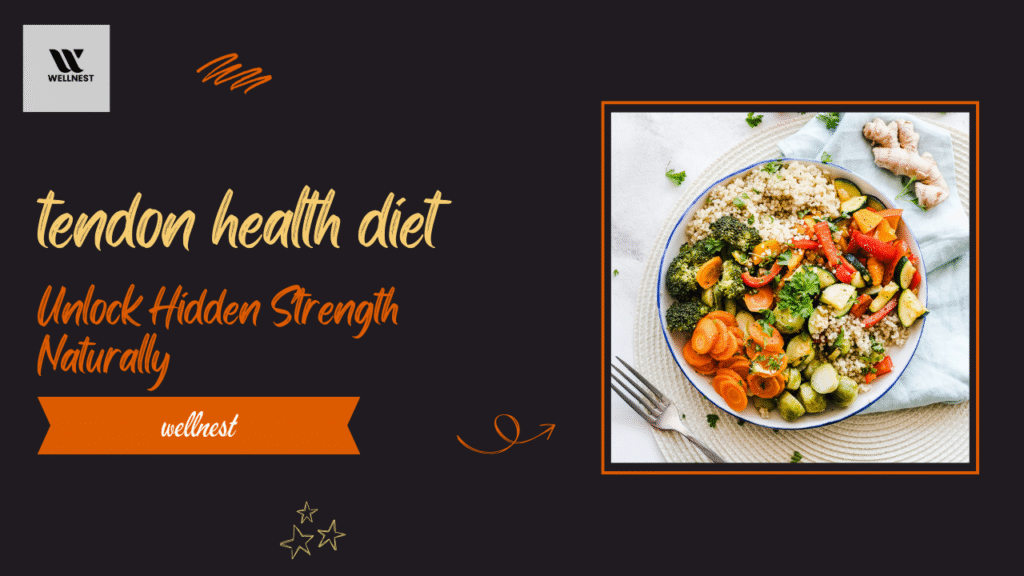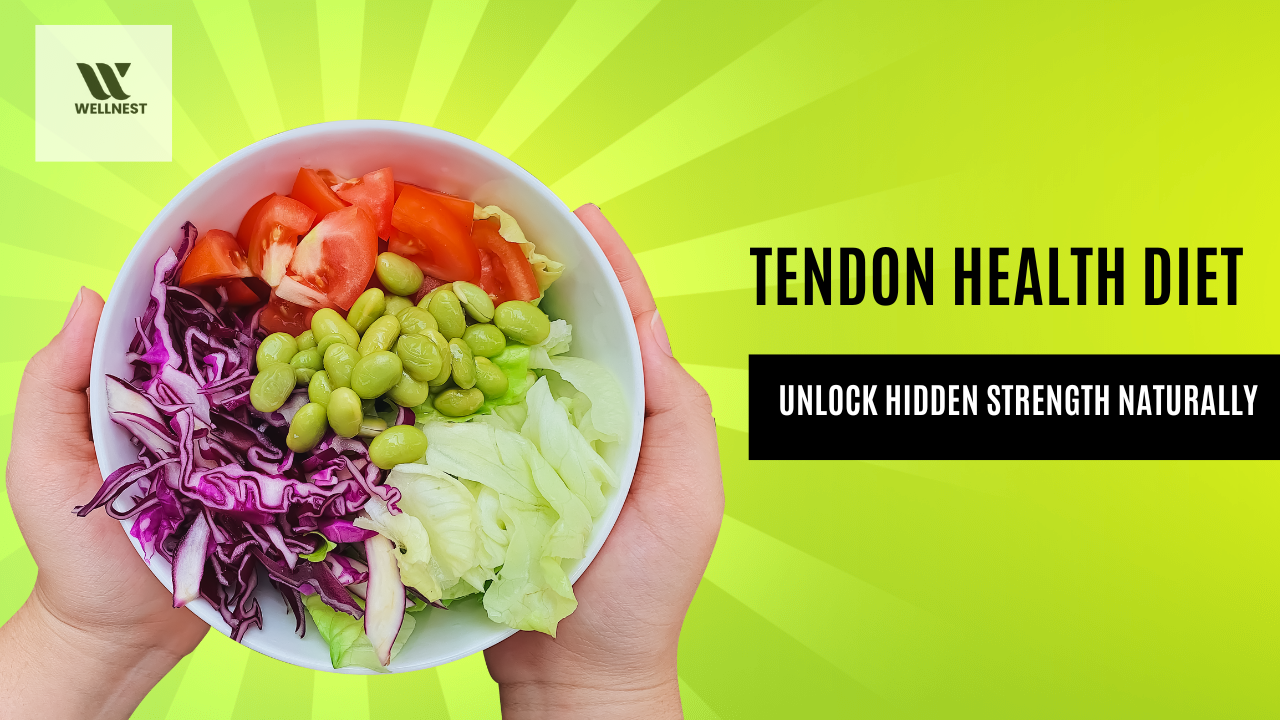So whether you’re healing an injury or trying to stay active and p ain-free, targeting your diet for tendon health can make a world of difference. Most people direct their attention at stretches and rehab and rest, but nutrition often takes a back seat — though it is one of the most crucial elements in tendon repair and performance.
In this guide, we will examine the foods, supplements and habits you need to keep your tendons strong, flexible and pain-free. We’ll also show you what to eat, what not to eats and how to organize your meals for the best tendon health.
Feeding Tendons and the Role of Diet in Tendon Rehab
Tendons are tough, fibrous bands of tissue composed primarily of collagen. Being relatively avascular, they ‘heal’ much slower than muscles due to poor blood supply or skin. This only serves to underscore the importance of nutrition for tendon healing.
Here’s how key nutrients help the repair process:
Tendon tissue is rebuilt with amino acids from protein.
Vitamin C boosts collagen production.
Omega-3 fatty acids reduce inflammation.
Collagen peptides enhance the expression of tendon-related proteins.
Antioxidants fight the effects of oxidative stress due to overuse or injury.
Quick Tip: For faster tendon healing, do collagen + vitamin C together 30 – 60 minutes before rehab. Timing matters!
Tendonitis Foods to Avoid: What Slows Recovery
One of the quickest ways to sabotage your recovery is by consuming the wrong foods. In the long term, inflammation from a bad diet can promotes tissue damage, slow repair and increase pain.
Here are the foods to avoid with tendonitis:
Processed Sugars – cause systemic inflammation and raise AGEs (Advanced Glycation End Products) which break down collagen.
Frying Foods and Trans Fats – Cause joint inflammation, tendon inflammation.
Processed meats – associated with oxidative stress.
Too much alcohol –HeylThe way it impairs the synthesis of protein and absorption of nutrients.
Highly refined carbs – pie, stuffing (bread), mashed potatoes and gravyCarbohydrates like this make your blood sugar spike and cause inflammatory responses.
Eat This Instead: Whole foods are your best bet, especially ones with anti-inflammatory properties like leafy greens, berries, nuts and fatty fish.

Is Tendon Healthy to Eat? The Surprising Benefits of Tendon The post appeared first on.
Did anyone ever wonder, is tendon healthy to eat? Surprisingly, yes!
In fact, there’s also a big “but:” Eating cooked animal tendons (which are a part of popular dishes like bone broth and various Asian soups) could actually have some health benefits.
Benefits of consuming tendon:
Abundant in collagen, particularly Type I and Type III (the varieties we have in our tendons).
Supports joint and tendon structure.
Includes glycine and proline, which are important amino acids for the regeneration of connective tissues.
How to Eat It: Seek out slow-cooked beef tendon, bone broth or gelatinous cuts such as oxtail and shank.
Best Supplements for Tendons and Ligaments Healing
Food is your foundation, but there are some supplements which can be helpful for tendon and ligament repair.
Below are the top supplements that can help heal tendons and ligaments:
Collagen Peptides – 15g daily, with a focus before exercise with vitamin C.
Vitamin C – supports the production of collagen; 50-100 mg along with collagen.
Omega-3s (EPA/DHA)—diminish chronic inflammation.
Gelatin – also a rich source of tendon building amino acids.
Vitamin D – important for immune function and collagen synthesis.
Magnesium – support muscle and tendon relaxation and repair.
Supplement Tip: Be sure to always consult with your physician before starting any new supplements, especially if you have existing health conditions or are taking medication.
Tendon Health Supplements That Work (And Which Ones Don’t)
Not all tendon supplements are created equal. Here’s what to keep an eye out for when selecting high-quality products:
| Collagen | Hydrolyzed peptides, 15–20g/serving |
| Omega-3s | At least 1,000 mg combined EPA/DHA |
| Vitamin C | Buffered or liposomal for better absorption |
| Vitamin D3 | 1,000–2,000 IU daily (check blood levels) |
| Magnesium | Glycinate or citrate form for best absorption |
Clinical Note: The combination of these nutrients taken together over an 8–12 week period will likely provide some measurable benefit (reduction in pain and improvement in tendon function).
How Much Vitamin C Does the Body Need for Tendon Regrowth?
As for how much vitamin C for tendon repair, more is not necessarily better — but timing and dosage are important.
Recommended dosage for tendon healing:
50-100 mg of vitamin C 30-60 minutes before workout when taken with collagen or gelatin.
For health: 75-90 mg/day (recommended daily allowance), but you may want to take more when you are injured.
Best sources of vitamin C:
Oranges, kiwi, strawberries
Bell peppers
Kale and broccoli
Why it matters: Vitamin C is a co-factor in producing new collagen. Without it, collagen supplements are unlikely to work as well.
Best Food for Ligaments and Joints: 5 Things to Eat Every Day
Ligaments and joints, much the same as tendons are extremely reliant on nutrition for strength and integrity. So, what is the best food for ligaments and joints?

Top ligament-supporting foods:
Fatty fish (salmon, mackerel) – filled with omega-3s
Broth or bone broth – rich in collagen and amino acids
Chia Seeds – loaded with plant based omega3s
Nuts and seeds – rich in zinc and magnesium
Citrus fruits – for vitamin C
Kale And other leafy greens—packed with anti-inflammatory nutrients
Avoid: Overly sweetened, fried and over-processed food — they breed inflammation that hurts your joints and ligaments.
The Big Picture of Ligaments and Tendons
Together with ligaments, tendons stabilize your joints, support movement and prevent injury. It will require a strategy for nurturing both over the long term.
Healthy Influence of Ligament and Tendon are Constructed on:
The right combination of macronutrients (protein, fat, carbs)
Daily support for overall digestive health and wellbeing (boost your immune system too, especially under the weather) with beneficial daily use of Vitewise micronutrients.
Healthy body weight
Proper exercise and mobility work
Controlling your blood sugar and cholesterol (each associated with tendon degeneration)
Sustained effort pays off. And even small adjustments — think swapping soda for green tea, or slinging chia seeds in your smoothie — can over time build your resistance in these vital connective tissues.
Final Words: Eat Smart, Heal Quick, Be Well
You don’t need to completely overhaul your diet overnight, but if you are committed to recovery or preventing injuries, optimizing your tendon healthy diet is a no brainer.
Your next steps:
✅ Pre-workout – Have collagen + vitamin C.eulerAngles We’ve already covered the muscle repair, but don’t forget about the prevention.
✅ Cut back on sugar and processed Time
Given time, consistency and the right nutrients, your body can grow back stronger, more resilient tendons, ligaments and joints.
